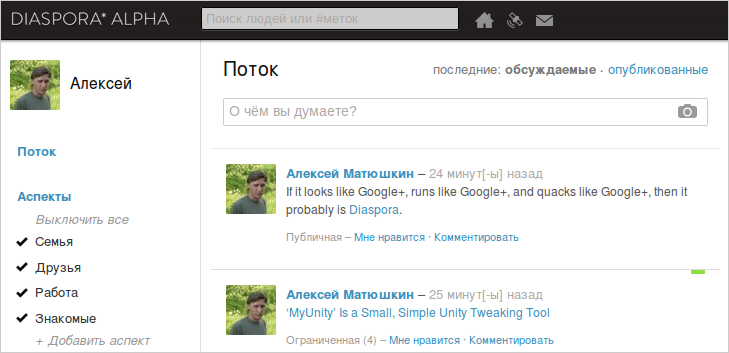If it looks like it’s Google+, it’s like
The word "Diaspora" is of Greek origin. I find this definition from the bibliological dictionary the most appropriate to the meaning that the creators put:
According to Wikipedia, the idea of creating a project came from a group of students of the Kuranta Institute of Mathematical Sciences (an independent unit of New York University): Dan Grippi, Maxwell Salzberg, Raphael Sofaer, Ilya Zhitomirskiy, after a speech on February 5, 2010 by Ebene Moglen, a professor at Columbia University, “Freedom in the Cloud ”, in which Moglen described the centralized social networks as“ spying on freedom ”.
I reprinted the main milestones of creating a “distributed social network” not accidentally: I follow the project almost from the ground up, but today my hands got to register on one of the “nodes” - distributed servers managed by Diaspora. I signed up (at https://diasp.org ) and ohrenel a bit. Doesn't anyone like this interface?

The diaspora supports a subset of the standard markdown . To become a "member" - just register at one of the "open sites". All traffic is via
')
It seems to me worth trying to build distributed P2P systems for solving “usual” tasks. As far as I can tell, the decentralized search engine YaCy was a pioneer (not counting npsttorrentov) - now the social network that lives on user machines has entered the α-stage. I didn’t find clear indications on the Internet from which this Google+ interface exactly copies the Diaspora’s decisions (the latter also includes
I do not pretend to originality, it just seemed to me that it might be interesting to someone.
Diaspora (Greek διασπορά - scattering), the stay of the people outside the country of its origin. Applied to Holy. The term Scripture refers to the old farm. communities scattered in reeds. lands (Jer 25:34; 2 Mack 1:27; John 7:35; James 1: 1).
According to Wikipedia, the idea of creating a project came from a group of students of the Kuranta Institute of Mathematical Sciences (an independent unit of New York University): Dan Grippi, Maxwell Salzberg, Raphael Sofaer, Ilya Zhitomirskiy, after a speech on February 5, 2010 by Ebene Moglen, a professor at Columbia University, “Freedom in the Cloud ”, in which Moglen described the centralized social networks as“ spying on freedom ”.
I reprinted the main milestones of creating a “distributed social network” not accidentally: I follow the project almost from the ground up, but today my hands got to register on one of the “nodes” - distributed servers managed by Diaspora. I signed up (at https://diasp.org ) and ohrenel a bit. Doesn't anyone like this interface?

The diaspora supports a subset of the standard markdown . To become a "member" - just register at one of the "open sites". All traffic is via
https .')
It seems to me worth trying to build distributed P2P systems for solving “usual” tasks. As far as I can tell, the decentralized search engine YaCy was a pioneer (not counting npsttorrentov) - now the social network that lives on user machines has entered the α-stage. I didn’t find clear indications on the Internet from which this Google+ interface exactly copies the Diaspora’s decisions (the latter also includes
# and @ familiar to us on twitter).I do not pretend to originality, it just seemed to me that it might be interesting to someone.
Source: https://habr.com/ru/post/133537/
All Articles